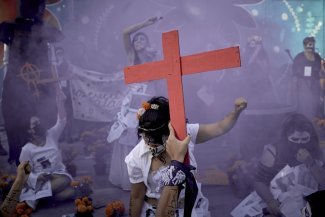One morning last December, not long before Christmas, President Evo Morales invited 30 young boys and girls for a breakfast meeting at the presidential palace. They were representatives of UNATSBO, the Bolivian trade union of child and adolescent workers.
The meeting took place three days after police brutally repressed a protest staged by working children opposed to the bill seeking to ban child labour.
President Morales himself is among those divided on the issue. He started work at the age of six, selling ice cream to help his family, and although against exploitation, he believes that working from a young age “cultivates a social conscience.”
Heading the delegation at the breakfast meeting with Morales was Henry Apaza, the 13-year-old natural leader of the trade union, who has been selling cigarettes since the age of seven in the satellite town of El Alto.
He has a talent for numbers and is one of the best pupils at his school, which he attends at night. Henry’s little sisters also work, selling Karaoke CDs in the same noisy streets, at an altitude of 4600 metres.
Henry is one of the 848,000 children working in Bolivia and one of the 14 million children aged between five and seventeen working in Latin America.
Around 80 per cent of Bolivia’s child labourers work in the countryside, almost exclusively for their families, as part of a long tradition that includes the performance of arduous tasks such as harvesting chestnuts or sugarcane and work in the mines.
Research has highlighted that 93 per cent of Bolivia’s working children aged between five and seventeen attend school, seemingly weakening the most solid argument that child labour must be eradicated because it perpetuates poverty and social exclusion.
“But what kind of academic performance can be expected of these children who have to go to school at night after working all day,” asks the prestigious Bolivian author and writer of children’s literature, Isabel Mesa.
She warns that going to school does not guarantee getting an education. Mesa is aware that a practice dating back centuries cannot be eradicated with a law, but she believes that “Bolivia must back education.”
In spite of the state assistance policies and macroeconomic growth of recent years, 59 per cent of the Bolivian population still lives in poverty; the figure rises to a staggering 80 per cent in areas such as Potosí.
Life expectancy continues to be very low: 65 years for men and 69 for women.
Poverty and ignorance are a lethal formula and much remains to be done before children like Henry can dedicate themselves fully to what they should be doing: going to school, playing with friends and developing as people and citizens.
“You can’t take work away from those of us whose life circumstances mean we have to work,” says Henry, speaking like an adult before his time and observing the world from under the visor of his cap.
He and his colleagues are demanding that age limits on street vending and looking after cars be removed from the law, and want the minimum age for the employment of children to be reduced to 12 - two years lower than the age established by the International Labour Organisation, back in 1973.
The law the Bolivian Assembly is due to pass this week is a source of huge contradictions: banning child labour could aggravate the situation, by making it clandestine. Even with the best will in the world, it could end up leading to child exploitation or even slavery. A far cry from progress. A far cry from development.
Source: La Nacion









